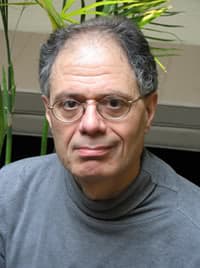Advertisement
On 'Radio Open Source,' An Intimate Look At Decades Of Depression
I've never met the Cambridge-based writer George Scialabba, but now I can't stop thinking about him.
About his personal psychiatric records, from his decades of treatment for depression, so courageously shared in a recent piece he wrote in The Baffler: "The Endlessly Examined Life," subtitled "A Most Chronic Depression." And about his extraordinary recent interview with his friend, Christopher Lydon, on "Radio Open Source." You can hear it in the podcast above.

The conversation is interspersed with dramatic readings of excerpts from George's medical records, and it includes a bit of kind encouragement from one who knows:
One of the things that hurts most about depression is that you don’t really believe that it’s ever going to go away, get better. It just doesn’t seem like something with a plausible cause. So you can’t imagine what the remedy is. So people should tell you: “Look, eventually, everybody gets a little better. Some people are still mildly depressed, but virtually no one is acutely depressed for decades and decades — their whole life. It’ll get a little better, and probably a lot better. So hang on.”
So many of us know depression personally — one in 10 Americans, by an estimate that must set the bar very high — that I expect this powerful, double-platform exploration of George Scialabba's experience will elicit very varying personal responses. "Radio Open Source's" post about the interview includes just one comment, at last look, but it's a gorgeous one, including this:
Well, you would think that this subject is not where you want to go in this particular winter of 2015. But it's not about depression. Or not about only that. What it's really about is what happened in spite of it or because of it; what happens climbing out of it, or trying to. I have had to learn and will probably have to learn again that we are not only our particular illness. It's the illness, the suffering, the pain, which you can never convey (but need to try) even to the most sympathetic, that pain itself that is the door through which you walk to somewhere else. But also I think one needs to have something to grab onto — maybe the rope of creative expression and reaching out. Something.
One brief personal reaction: I like George's theory that depression may be the result of faulty emotional "shock absorbers." But I was most struck by the possibility that, after he ended his intense involvement in the religious order Opus Dei, he never fully recovered because he needed that involvement, perhaps that faith, to face life. He had a great big Human Condition problem more than a personal psychological problem. Just a thought. But it's what I find most echoing in my mind. That, and the fact that his psychiatrists seemed to mean very well, and some surely did help him, but they came nowhere near a solution to the enduring mystery of his long emotional suffering.
Read excerpts of George's medical records in the Baffler piece here, listen to the podcast above, and please share what echoes most for you.
Further listening: "Radio Open Source: The Untethered, Untenured Mind"
